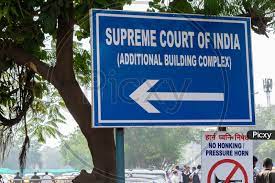The Civil Appeal assails the Order of Eviction ordered by the Rent Controller vide Order dated 19.02.2009 in Ejectment Application No. 334 of 2004 on the file of Rent Controller, Jalandhar and the Judgment dated 24.04.2002 in Civil Revision No. 2121 of 2009 before the High Court of Punjab and Haryana at Chandigarh. The Respondent initiated the eviction proceedings under Section 13, read with Section 13-B of the Act[The East Punjab Urban Rent Restriction Act, 1949.] against the Appellant. (Para 2)
At the outset, it may be noticed that the Civil Appeal has been admitted by referring to a few similar petitions/appeals pending in this Court. The similarity of an issue with a pending matter has been raised as one of the grounds for granting Special Leave, and the Civil Appeal is numbered. With the dismissal of the connected matters, the natural result is that the instant Appeal must follow. Since a distinguishing feature is raised by the Learned Counsel for the Appellant, we would consider the maintainability of the Civil Appeal. We notice that the Appellant confined the challenge to the Order of Eviction only to three grounds before the High Court. Either by choice or for any reason, the Appellant before the High Court did not press any other ground available against the Order of Eviction or the Order refusing to grant leave to the Appellant. Having done so, in the Civil Appeal, contentions do not expand more than the scope of consideration either by the High Court or the Rent Controller. (Para 13)
We have refused the new pleas introduced by the tenant in Civil Appeal No. 8641 of 2009, and the Appeal herein does not have a better case on new pleas. (Para 14)
The Appellant failed to make out a case that the appraisal of available material is either perverse or the Rent Controller informed a reason for granting leave to defend. In our jurisdiction under Article 136 of the Constitution of India, we do not ordinarily go into the credibility of the findings of fact, reappraise the averments, and record results. In the case on hand the circumstances stated are very normal and have been examined from the perspective in which they are required to be reviewed by the Rent Controller while exercising the jurisdiction under Section 13-B read with Section 18-A Sub-Sections (4) and (5) of the Act. No ground for any interference is made out whichever way the contentions are considered by this Court. (Para 17)
SUPREME COURT OF INDIA
2023 STPL(Web) 311 SC
[2023 INSC 874]
Smt. Shanta Rani Widow Of Amrit Lal Vs. Nasib Kaur Widow Of Harbhajan Singh
Civil Appeal No. 7328 of 2010-Decided on 5-10-2023
https://stpllaw.in/wp-content/uploads/2023/10/2023-STPLWeb-311-SC.pdf







